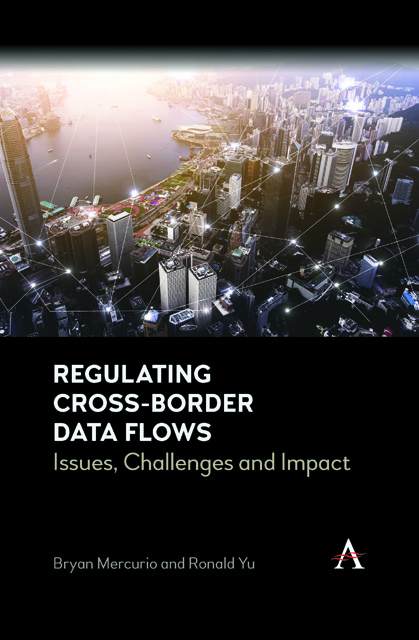3 - Competing Models of Data Governance
Published online by Cambridge University Press: 22 November 2022
Summary
The internet is global and borderless, but regulators in most jurisdictions attempt to ensure the relatively free flow of data and the maintenance of ‘trust’ in the system. Regulators mostly act independently and without any direction from the international community, resulting, unsurprisingly, in a variety of incongruent and incompatible regulations.
The internet relies on a global flow of data, with a growing number of dataintense digital services, utilizing a high amount of data in their production processes. In many cases, the data cross borders multiple times before the service is consumed (van der Marel and Ferracane, 2021), and regulators must therefore appreciate the necessity of cross-border data flows from a trade perspective (World Economic Forum, 2019). The free flow of data is critical to internet-based services (e.g., cloud computing) and e-commerce and essential to the development of technologies that rely on access to high-quality data that often resides in more than one territory. Cross-border data transfers are also important for less obvious reasons, including cross-border health, investigations and medical emergencies (Moorthy, 2020). An example of the last point is the 2013–2016 Ebola virus outbreak in West Africa where deficiencies in data-sharing mechanisms brought the question of data access to the forefront of the global health agenda (Giles-Vernick, et al., 2016).
Through the development and deployment of these data-reliant technologies and solutions, nations and the companies working within those borders can expect to derive increased economic and social values from crossborder data flows. In fact, the data economy has risen even more rapidly in a COVID-19-disrupted world in its importance for new economic growth opportunities (Casalini et al., 2021).
Both countries and industries recognize the importance of keeping global data flows as unrestricted as possible. As this chapter discusses, most governments are increasingly keen to ensure that their rules of data governance are consistent with those of other countries and have begun negotiating trade agreements to ensure the compatibility of standards. Likewise, companies seeking influence intensely lobby at the domestic and international levels for relatively unrestricted data flows. In establishing policies for cross-border data transfers, governments must also be aware that they can only attract inbound transfers of data and information technologies if people, businesses and other governments trust their system and regulatory framework.
- Type
- Chapter
- Information
- Regulating Cross-Border Data FlowsIssues, Challenges and Impact, pp. 19 - 38Publisher: Anthem PressPrint publication year: 2022

